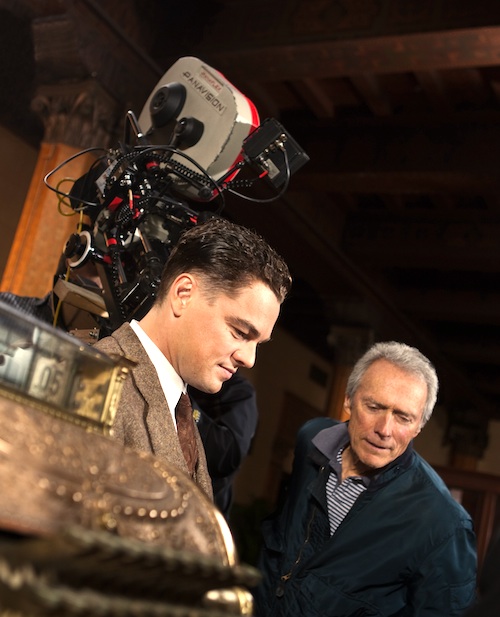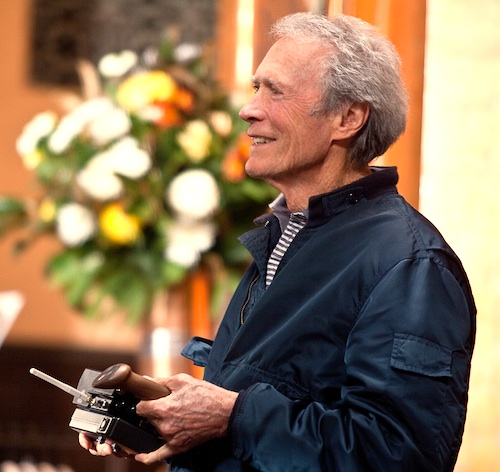
By Jason Apuzzo. I wanted to briefly mention a superb interview conducted by Patrick Goldstein in The LA Times today with Clint Eastwood, director of the new film J. Edgar. Patrick did an excellent job of getting Clint to talk candidly about his political views, and also of teasing out some of the basic ideas that have motivated his career.
In the interview, Clint talks about the various Republican nominees for President (Cain, Romney, Perry), about his attitude toward spending – both the government’s, and his own as a professional filmmaker – and other issues of the moment.
The interview also touches on what I believe to be a basic, rock-bottom issue for Eastwood in his life and career: the need to do tough things in order to survive in an unforgiving world. There is a hard, unsentimental quality to Eastwood’s films that I’ve always liked. Eastwood’s characters are never saints; instead, they’re pragmatists and loners, navigating what is often a morally ambiguous world. (You even feel this in the way Clint’s films are photographed – usually in a shadowy, chiaroscuro style.) Clint is never out to b.s. his audience about human nature, or about what people sometimes need to do to get ahead. As Patrick aptly puts it in his article, “[w]hen you’re in Clint Eastwood country, it’s the strong who survive.”
Eastwood is part of an older, Depression-era generation that lived through a period of time – the economic crash of the 1930s – when the bottom completely fell out of society. It was a period in time when, even though FDR had established a safety net for the destitute, there nonetheless wasn’t the kind of accumulated wealth that we have today after generations of economic growth. Even the poorest people today still have things like electricity, refrigerators, cars, telephones, TVs, etc.; this wasn’t the case during the Great Depression. When people were poor during the Depression, it was in ways that today’s Occupy Wall Street crowd – chattering on their cell phones and Twitter accounts – can’t possibly fathom. The only way we can grasp these things today is by talking to the older generations, or perhaps by reading John Steinbeck or Studs Terkel, or looking at the photography of Dorothea Lange … or watching a film like Clint Eastwood’s Honkytonk Man.

With Eastwood having lived through the hardship of this period as a young person, my sense is that over the years he’s developed two somewhat conflicting qualities: a hardness of spirit, for which his own characters (The Man With No Name, Harry Callahan) are famous, but also a more forgiving, ‘libertarian’ streak in terms of allowing people a wide berth to do what they they think they need to do in order to get by. It’s telling, for example, that of the various Republican candidates Eastwood would be drawn to Herman Cain. “I love Cain’s story,” says Eastwood in Patrick’s article. “He’s a guy who came from nowhere and did well, obviously against heavy odds.” Those same words could easily describe Clint, himself.
I haven’t seen J. Edgar yet, but having read the screenplay it’s easy to see how Hoover’s story fits into Clint’s thinking. Hoover did what he thought he needed to do in order for the country to survive against organized crime, political terrorism, and communist infiltration. This does not mean, however, that Hoover was a saint, or that his legacy should be sentimentalized. It still appalls me, for example, that there was a time when great men and advocates of freedom like Frank Capra and Thomas Mann had FBI files on them. There should be no place for this kind of thing in American life.
At the same time, though, there is always the basic need for the country to survive. That, I strongly believe, was Hoover’s overriding motivation – and it was the right one. As a successful actor-director now working into his 80s, it’s a motivation that Clint Eastwood surely understands.
Posted on November 8th, 2011 at 12:42pm.
First … nice editorial, Jason. This is perfect subject matter for Eastwood, and I can’t wait to see the film.
Clearly the conflict here is between preservation of liberty and self-preservation as a nation. That works as a theme for this picture, but I think it would be cool to examine it on a broad scale.
In my opinion, the snake of collectivism started to slither through the door before Hoover, and pretty much broke down the door during and after FDR.
As Federalism dwindled and states began shrinking to the Federal leviathan, collectivism was given power. I think during this time, the nation became softer. Couple that with the increasing power of the Federal government, and we have the beginning of the trouble we’re in now.
My point is that Hoover appears to have been a necessary evil at the time. In a perfect world where the Federal government adhered to the Enumerated Powers, encroaching collectivism couldn’t be much of problem because it would’ve had to infiltrate each and every state individually. No state sovereignty and an aggressive Washington DC made a super highway for collectivists to creep into our lives.
Men like Hoover were then given a pathway to power. I will always believe that communism is defeated through our churches, which preach to watch out for your neighbor, so no one like the government will be able to promote themselves as saviors.
You may be right: Maybe Hoover did have the preservation of his country in his mind. I just will never see how a huge government police force can stop communism. Considering government controls way more than half of our capital, is our biggest lender, our biggest insurer, and our biggest employer, I ask … was it worth it?
All interesting issues, Vince, and thanks so much for your comments. My own hope is that J. Edgar is actually entertaining. Eastwood was somehow able to address a lot of these same topics in his Harry Callahan movies, while making the exercise enjoyable and fun. What I’m worried about, re: J. Edgar, is that it’s going to be on the dry side, a history lecture. I’m not looking forward to that.
That’s a good point. When Eastwood isn’t at his best, his films do tend to get a little dry. Based on what I see from “J. Edgar,” that issue could reveal itself.
Has any one else seen the story floating around that George H. W. Bush briefly considered Clint as his VP running mate in ’88? Apparently, Clint knew nothing about is, but it makes one wonder . . . What if?
I haven’t heard anything about that. I doubt he would’ve accepted the offer, though.